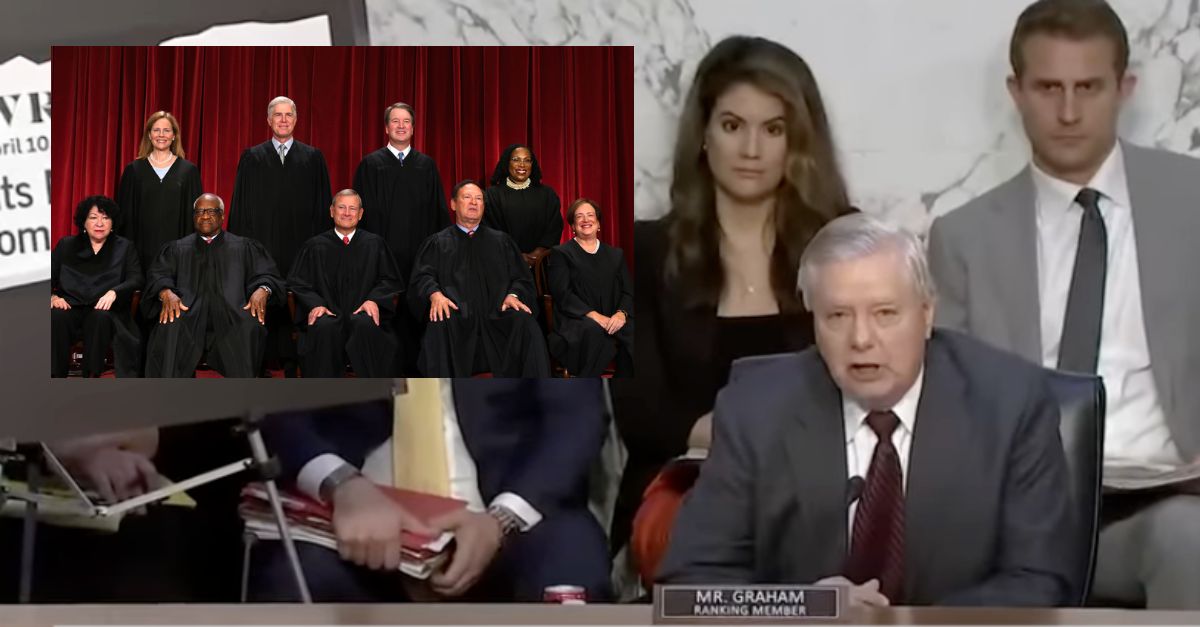
Sen. Lindsey Graham (R-S.C.) speaks out about the proposed Supreme Court ethics bill (via YouTube screengrab). Inset: The justices of the U.S. Supreme Court (Alex Wong/Getty Images).
Following a year plagued by ethics scandals at the nation’s top court, the Senate Judiciary Committee passed a measure Thursday that would subject Supreme Court justices to stricter standards, increased public scrutiny, and a dedicated investigative board to examine their conduct.
The bill’s future, however, does not seem promising.
Senator Sheldon Whitehouse (D-R.I.) sponsored the Supreme Court Ethics, Recusal and Transparency Act, meant to address what the senator has called the Court’s “self-inflicted ethics crisis” and mandate that the Court adopt a detailed code of ethical conduct. The bill passed 11-10 strictly along party lines.
“What you’re trying to do is not improve the Court, you’re trying to destroy it as it exists,” Lindsey Graham (R-S.C.) argued as debate on the bill proceeded. “You’re going to fail miserably. This bill is going nowhere.”
While Senate Judiciary Chair Dick Durbin (D-Ill.) hailed the the bill as “a crucial first step in restoring confidence in the Court,” Senate Republicans were blunt about the bill’s unpromising future.
“You don’t have to be Oliver Wendell Scalia to figure out that this legislation is meant to be a court-killing machine,” Sen. John Kennedy (R-La.) said. “This thing’s dead as fried chicken on the Senate floor and it’s dead as fried chicken in the House.”
Kennedy appeared to mock ethics questions in broad strokes back in 2018 when he asked then-Judge Brett Kavanaugh whether he had ever been “in trouble” during high school.
Read Related Also: Ellen Greenberg: Mayor Under Criticism as Teacher’s Death Ruled as Suicide Despite 20 Stabs Wounds
“Were you more of John Boy Walton type or Ferris Bueller-type?” Kennedy asked a chuckling Kavanaugh at the time.
Following the bombshell leaked draft of Justice Samuel Alito’s opinion overturning Roe v. Wade in May of 2022, criticism over the failure to identify the source of the leak escalated into calls for broad ethics reform at the Court. Since then, public outrage has grown over Justice Clarence Thomas’ undisclosed dealings with billionaire Harlan Crow and Chief Justice John Roberts’ having “respectfully declined” to appear before a congressional subcommittee on judicial ethics in April.
Although much of the focus relating to judicial ethics has centered around conservative justices, the Court’s liberal wing has not been insulated from scrutiny.
Justice Sonia Sotomayor made headlines earlier this July for allegedly “pressuring” universities to purchase hundreds of copies of her books — an allegation against which the Court issued an unusually detailed and direct responsive statement.
During debate over the ethics bill, Sen. Mike Lee (R-Utah) suggested an amendment that would impose harsh criminal penalties for a leak such as the one involved in the Dobbs v. Jackson Women’s Health Organization opinion draft. Sen. Tom Cotton (R-Ark.) proposed the bill be amended to focus on journalists rather than Court personnel. Amendments related specifically to leaks were defeated 11-10.
The Supreme Court Ethics, Recusal and Transparency Bill is expected to face strong Republican opposition in both the House and the Senate as leading GOP legislators in both chambers of Congress have said the justices should “oversee themselves.”
Have a tip we should know? [email protected]








